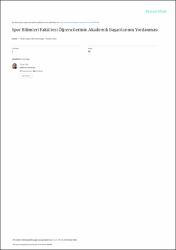Spor bilimleri fakültesi öğrencilerinin akademik başarılarının yordanması

View/
Access
info:eu-repo/semantics/openAccessAttribution-NonCommercial 3.0 United Stateshttp://creativecommons.org/licenses/by-nc/3.0/us/Date
2022Metadata
Show full item recordAbstract
Bu araştırma Spor Bilimleri Fakültesi öğrencilerin, akademik motivasyon, öz yeterlik
ve mükemmeliyetçiliğinin, akademik başarıyı yordama gücünü belirlemek amacıyla
yapılmıştır. Araştırmanın örneklemini 2021-2022 Eğitim-Öğretim Yılı Balıkesir
Üniversitesi Spor Bilimleri Fakültesinde öğrenim gören toplam 339 öğrenci
oluşturmuştur. Verilerin toplanması amacıyla kişisel bilgi formu, akademik
motivasyon ölçeği, akademik öz yeterlik ölçeği ve akademik mükemmeliyetçilik
ölçeği kullanılmıştır. Araştırma sonucunda, öğrencilerin akademik motivasyon
puanları cinsiyet, yaş ve sınıf değişkenine göre anlamlı farklılık gösterirken, bölüm
değişkenine göre farklılığa rastlanmamıştır. Ayrıca, öğrencilerin akademik öz yeterlik
puanları hiçbir değişkende anlamlı farklılık oluşturmamıştır. Öğrencilerin akademik
mükemmeliyetçilik puanları, yaş ve sınıf değişkenlerinde anlamlı farklılık gösterirken,
cinsiyet ve bölüm değişkeni açısından anlamlı farklılığa rastlanmamıştır. Ek olarak,
araştırmaya katılan öğrencilerin cinsiyet, bölüm ve sınıf değişkenlerine göre AGNO
dereceleri anlamlı farklılık olduğu, diğer yandan, yaş değişkeni açısından farklılık
olmadığı tespit edilmiştir. Çoklu doğrusal regresyon analizi sonucunda,
motivasyonsuzluğun olumsuz yönde, öz yeterliğin ise akademik başarıyı olumlu yönde
yordadığı saptanmıştır. Araştırmadan elde edilen sonuçlar doğrultusunda, akademik
başarıyı etkisi olabilecek farklı duyuşsal etmenler üzerine araştırmaların yapılması
önerilmektedir. The aim of this research was to determine the academic motivation, self-efficacy, and
perfectionism of the students of the Faculty of Sport Sciences and the predictive power
of academic success. The sample of the study consisted of 339 students studying at
Balıkesir University Faculty of Sport Sciences in the 2021-2022 academic year.
Personal information form, academic motivation scale, academic self-efficacy scale,
and academic perfectionism scale were used to collect data. As a result of the research,
while the academic motivation scores of the students differed significantly according
to gender, age, and class variable, no difference was found according to the department
variable. In addition, students' academic self-efficacy scores did not differ significantly
in any of the variables. While students' academic perfectionism scores showed a
significant difference in age and class variables, no significant difference was found in
terms of gender and department variables. In addition, it was determined that there was
a significant difference in the Grade Point Averages of the students participating in the
research according to gender, department, and class variables, but there was no
difference in terms of age variable. As a result of the multiple linear regression
analysis, it was determined that a motivation predicted negatively, and self-efficacy
predicted academic achievement positively. In line with the results obtained from the
research, it is recommended to conduct research on different affective factors that may
affect academic achievement.
Source
Akdeniz Spor Bilimleri DergisiVolume
5Issue
2Collections
The following license files are associated with this item:


















